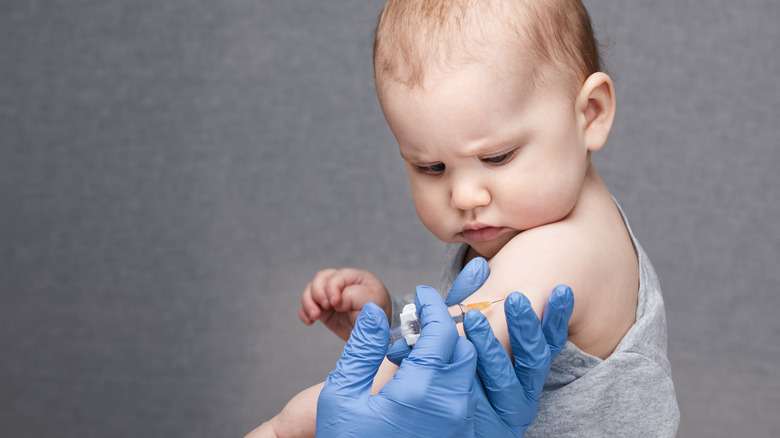Dr. Michael Daignault On The Difference Between Pfizer And Moderna COVID Vaccines For Kids Under 5 - Exclusive
Parents everywhere have been holding their breath for the COVID-19 vaccine to become available for kids under age 5. At last, the smallest members of our families are eligible to get their jabs. Now that we've gotten the green light, a lot of questions are coming up about which vaccine is the best choice, with both Pfizer and Moderna having completed clinical trials in little ones.
To be sure, there are many differences between the two COVID-19 vaccines, including the time between each shot in the series and how the drug makers approached testing their formulations. Health Digest turned to a pandemic warrior, Michael Daignault, MD, a board-certified ER doctor in Los Angeles, to talk us through what each vaccine offers and give advice on the series that is the best fit depending on your needs.
In our exclusive interview with him, we also learned about side effects and why it's important for tots who have already been infected with the virus to still get some vaccine-based protection. Now, let's look at the distinctions between Pfizer and Moderna's COVID-19 vaccine for children ages 6 months to 5 years old.
Dose sizes set Pfizer and Moderna apart
Dr. Michael Daignault explained to Health Digest that each drugmaker chose a different approach when it came to their clinical trials.
"Pfizer focused on tolerability, choosing the smallest effective dose at just three micrograms of antigen per dose," he said. "Their concern was that if the vaccine caused too many side effects and kids were miserable, parents wouldn't bring them back for additional doses." Initially, a low dose didn't trigger a hearty enough immune response. "So the company did additional safety and efficacy trials on adding a third dose, to be done eight weeks after the second," Daignault said. Kids whose parents who go with Pfizer will ultimately complete their vaccine series in eleven months.
Meanwhile, Daignault noted that Moderna's focus was not tolerability, but efficacy. "Their vaccine is 25 micrograms in each dose, four weeks apart, so kids will have high protection much faster with Moderna than with Pfizer," he explained. The tradeoff of faster protection is that kids may experience more common side effects since the dose is larger.
The takeaway here? "Parents need to weigh two versus three doses as well as time to protection and side effects," Daignault advised.
Consider the timeline to protection versus safety data
The Pfizer vaccine, which is approved for kids 6 months to 4 years, is a three-dose regimen, Dr. Michael Daignault explained to Health Digest. "The first two doses are done within three weeks, and then the third dose is done five months later," he said. "The Moderna vaccine is approved for those 6 months to 5 years. It's a two-dose regimen given four weeks apart." Although at this time Moderna's series consists of two shots, Daignault said that a third shot or booster is likely going to be recommended a few months down the road.
"There were no head-to-head trials comparing the two types of vaccines so we can't say one is better than the other," he told us. In other words parents, there is no right answer here but rather, a matter of preference.
"If you want your child 'fully vaccinated' by the school year, go with Moderna, [because] it can be done over four weeks," Daignault recommends. But it's also important to note that there is more safety data available on the Pfizer vaccine overall versus Moderna's. "Remember, there's a Pfizer vaccine for those 5 to 18, but not a Moderna vaccine for this age group," he reminds us, ending with a final piece of advice: "If your concern is which vaccine has the most safety data for kids and adolescents, go with Pfizer."
Michael Daignault, MD, is a board-certified ER doctor and COVID-19 expert in Los Angeles. Find him on Instagram.



